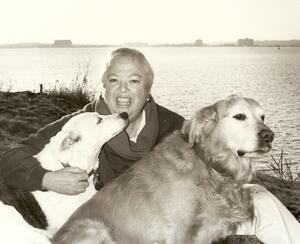Raysa Rose Bonow
In a time when women television producers were few, and female executives non- existent, Raysa Bonow came to Boston and changed the face of daytime TV programming.
As Executive Producer of "For Women Today," later renamed "The Sonya Hamlin Show," she introduced Boston daytime viewers to a kind of television they had never seen before. In the wake of the social turbulence of the late 60’s and rise of feminism of the early 1970’s, Raysa was determined to abandon the typical daytime fare of cooking, fashion and celebrities and open up a world of new ideas to women at home.
Intimate on–air consciousness raising sessions between local housewives and editors of the brand new Ms. magazine; live nude breast self-examination for cancer detection; an explicit week on sexuality for the single, the married, the gay and the straight —programming that was unheard at the time, especially in heavily Catholic Boston. And the chronicling of one viewer’s pregnancy up to and including the delivery of the baby—candidly filmed from the doctor’s point of view. For local television in the early 1970’s—all of this was revolutionary.
“What our show is trying to do is this: inform, entertain, provoke, expose—explore just about everything to get our audience thinking about all the things that are happening around them and to them,” Raysa told the Boston Globe in 1972. “There are the doers in this world and there are the passive people who live vicariously through the doers. Thinking and learning is doing, because it makes you active and aware of your life”.
Raysa was recruited to WBZ-TV in Boston after associate producer jobs at NBC in New York. She was teamed with host Sonya Hamlin, an intelligent, mid-life suburban wife and mother, who was the station’s Arts reporter. Hamlin’s one condition for leaving the security of her Arts job; that the station hire an all -women staff and give them carte blanche to experiment.
Arriving from New York, Raysa recruited as her lieutenant Carolyn Wean, a former Northeastern University history professor, and a staff of workaholic young women driven to prove they could make a success of an intelligent daytime show for women.
Raysa was a large woman with a topknot of bright red hair, who battled weight her whole life. Never married, she maintained a long term and usually long distance relationship with her 30-year partner, Richard Taylor.
To fill her life in Boston, she embraced her staff as her family, regularly inviting them and program guests to elaborate parties at her waterfront home in Marblehead. Her favorite was the summer “White Party” to which guests were required to wear white, a la Truman Capote’s “Black and White Ball”—and invited to play croquet on the lawn.
“If Raysa was your friend, she wanted to control your life and direct you in every way,” remembered longtime producer friend Howard Papush. “Early in our friendship when we were young producers in New York, she said to me ‘I don’t like your haircut.’ She told me to go out and get a real styled haircut. Control. That was her idea of love. But she really guided me in ways I wouldn’t have picked up on.”
Raysa was not especially observant but she had a Jewish sensibility and her longest enduring friends were all Jewish.
For all her producers, Raysa was a combination task master and mentor pushing them to dream up their most creative and original programs. For those who wanted to go on to be on-air stars or work in another aspect of television, she would eagerly guide and coach them to the next job.
While she opened the door to feminism on television, she never her lost her love for the glamour of Hollywood and New York.
“The life she wanted to live, she lived in her shows,” reflected Howard Papush.
“Wouldn’t it be fun to have dinner with Alfred Hitchcock, and Vincent Price, and the fashion editor of Esquire?” Raysa would ask the staff. A week later, the show would mount a full-scale dinner party, live in the studio, with all the desired celebrities—a sparkling chandelier overhead and a full lobster dinner served by Anthony’s Pier 4.
Raysa was always aiming bigger and higher. Toward the end of her tenure at WBZ-TV, she helped conceive Yes We Can, an 18-hour feminist extravaganza based at the Hynes Auditorium with dozens of women’s organizations offering a full day of information and advice to the public topped off by a prime time special featuring iconic I Am Woman pop singer, Helen Reddy.
Later she went on to develop "Look," a two–hour, daily, live magazine show at WNEV, Boston, which won the National Association of Television Program Executives’ Iris Award for program excellence. At "Look," she created an Adopt –a-Pet segment—tikuun olam for animals.
In a time before local stations relied heavily on audience research, Raysa was seen by management as having a “great gut” for choosing and developing successful on-air talent. Almost up to her death at age 80, she was predicting the winners on the popular network show "American Idol."
During her long and successful television career she also produced "People Are Talking" with Maury Povich at KYW-TV in Philadelphia, the "Pat Collins Show" on WCBS-TV, New York, and helped develop with David Susskind a TV version of People Magazine. She also served as Executive Producer at KDKA-TV in Pittsburgh.
Convinced she could do almost anything she set her mind to, she attended a weight loss program at Duke University losing 75 pounds; from her experience there, she wrote, How To Be A Thin Person, a Book-Of-The-Month Club selection, published by Random House in 1978.
When she retired from television she became a successful real estate broker on Boston’s North Shore and later in North Carolina.
Throughout her professional life, it was her television protégées, the people she discovered, mentored and supported and always wanted to stay connected to—who provided her deepest satisfaction.



